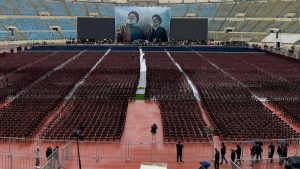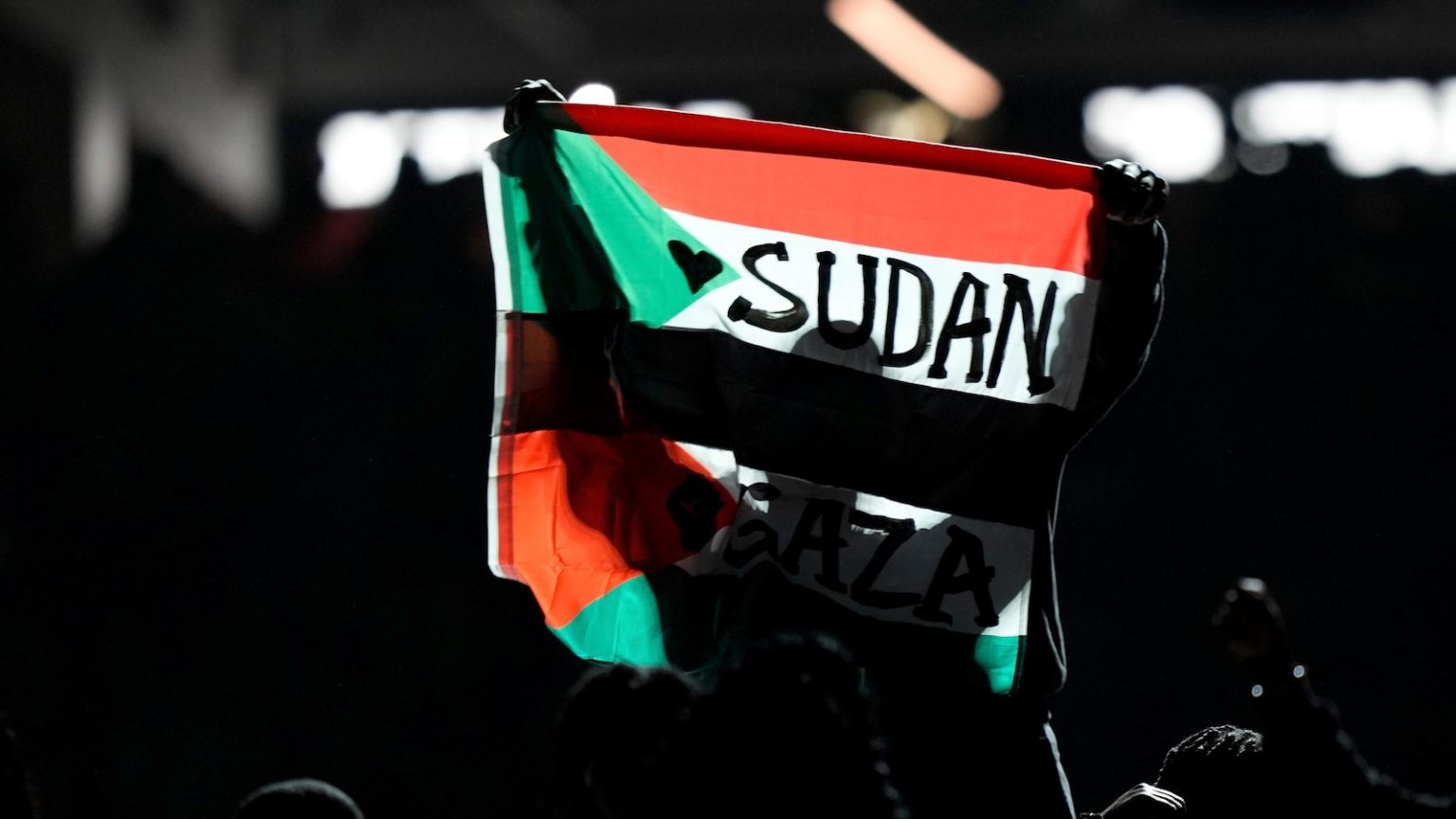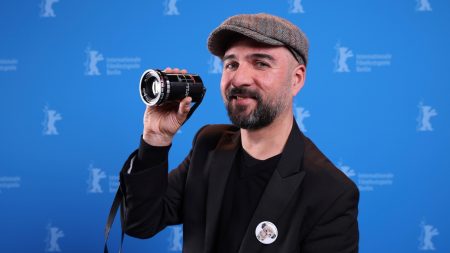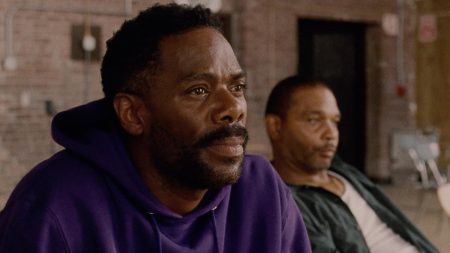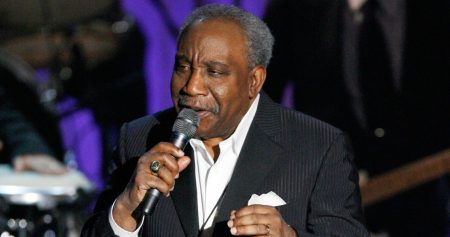A Bold Protest at the Super Bowl Halftime Show: Spotlight on Gaza and Sudan
A Symbol of Resistance Unfurled on a Global Stage
The Super Bowl halftime show, known for its dazzling performances and massive global audience, became an unexpected platform for political protest during Kendrick Lamar’s barnstorming set. A performer, whose name has not been disclosed, waved a flag referencing both Sudan and the Gaza Strip atop a car used as a prop in the performance. The act, though brief, carried significant weight, drawing attention to two of the most devastating conflicts currently gripping the Middle East and beyond. Security personnel at the stadium swiftly detained the performer, and while it remains unclear whether they will face formal charges, the NFL has announced a lifetime ban from its events. The halftime show’s organizers have since distanced themselves from the incident, stating that the flag-waving was not part of the planned performance.
The Gaza Strip: A Flashpoint of Enduring Conflict
The Gaza Strip, a narrow enclave along the Mediterranean Sea bordered by Egypt and Israel, has long been a focal point of regional and global tensions. At just 360 square kilometers (140 square miles), it is roughly twice the size of Washington, D.C., and three and a half times the size of Paris. Yet, its population is densely packed, with 2.3 million Palestinians calling the territory home before the escalation of the 2023 Israel-Hamas war. The conflict erupted in October 2023 when Hamas, the militant group that has ruled Gaza since 2007, launched a surprise attack into Israel, killing 1,200 people and taking 250 hostages. Israel responded with overwhelming force, unleashing a devastating air and ground campaign that has left much of Gaza in ruins. Local health authorities report over 47,000 Palestinian casualties, though they do not distinguish between combatants and civilians in their count.
A fragile ceasefire took effect on January 19 and has held to date, with Palestinian militants releasing hostages and Israel freeing some of the Palestinians it had detained. While the humanitarian community breathes a cautious sigh of relief, concerns remain about the long-term viability of the peace. Adding fuel to the fire, former U.S. President Donald Trump, who attended the Super Bowl, made controversial remarks suggesting that the United States was “committed to buying and owning Gaza.” Such statements have further complicated discussions about the enclave’s future. For decades, the Palestinian people have aspired to establish an independent state encompassing both the Gaza Strip and the West Bank, with East Jerusalem as its capital—a vision supported by much of the international community. Meanwhile, Israeli Prime Minister Benjamin Netanyahu has proposed a “revolutionary, creative vision” of resettling Gaza’s population, though this idea has been met with widespread rejection from Palestinians and global stakeholders.
Sudan: A Nation Torn Apart by Civil War
Sudan, a vast country in East Africa, has been plagued by instability since the ousting of longtime dictator Omar al-Bashir in 2019. A brief period of transition toward democracy was derailed in 2021 when General Abdel-Fattah Burhan, the head of the Sudanese military, and General Mohammed Hamdan Dagalo, leader of the paramilitary Rapid Support Forces (RSF), staged a coup. Since then, the RSF and Sudan’s military have been locked in a brutal civil war that has claimed over 28,000 lives, according to conservative estimates. The true toll may be far higher, with millions displaced and widespread famine pushing families to desperation.
In recent weeks, Burhan’s forces, including the Sudanese military and allied militias, have made significant gains against the RSF, retaking a critical refinery near the capital, Khartoum, and tightening their grip on the city. However, the escalation in fighting has also resulted in a surge in civilian casualties. Between January 31 and February 5 alone, the U.N. Human Rights Office documented at least 275 civilian deaths due to artillery, airstrikes, and drone attacks. Seif Magango, a spokesperson for the Human Rights Office, has called for an immediate cessation of hostilities, emphasizing the need for all parties to respect international law and protect civilians, including humanitarian workers and human rights defenders.
Celebrities and Activists Bring Attention to Forgotten Crises
Despite the vastly different origins and participants of the conflicts in Gaza and Sudan, activists and celebrities have sought to draw parallels between the two crises, emphasizing their shared themes of devastation and human suffering. American rapper Macklemore, for instance, made headlines last August when he canceled a concert in Dubai, citing the United Arab Emirates’ alleged role in the humanitarian crisis in Sudan. While the UAE has denied arming the RSF, U.N. experts have reported credible evidence of weapons being transferred to the paramilitary group on a weekly basis.
Macklemore’s decision was also influenced by his public support for Palestinians amid the Israel-Hamas war. He has been performing a song titled “Hind’s Hall,” dedicated to a young girl named Hind Rajab, who was killed in Gaza in a shooting that Palestinians have blamed on Israeli forces. By amplifying these stories, figures like Macklemore aim to raise awareness about the plight of those affected by these conflicts and to galvanize international action.
The Broader Impact of These Conflicts on the World
The crises in Gaza and Sudan are not isolated events; they have far-reaching implications for global stability, diplomacy, and humanitarian efforts. Both conflicts have exacerbated existing tensions in the Middle East and drawn in regional and international powers, complicating efforts to achieve lasting peace. The Gaza Strip, in particular, remains central to the Israeli-Palestinian conflict, a issue that has shaped U.S. foreign policy and international relations for decades. Meanwhile, Sudan’s civil war has destabilized a region already grappling with economic challenges, climate change, and political upheaval.
The human cost of these conflicts is immeasurable. Families have been torn apart, entire neighborhoods reduced to rubble, and millions left without access to basic necessities like food, water, and healthcare. The psychological toll on survivors—children especially—cannot be overstated. As the world grapples with these challenges, it is clear that diplomacy, accountability, and compassion must guide the path forward.
In the aftermath of the Super Bowl protest, the performer’s brief act of defiance serves as a reminder of the power of art and activism to bring attention to forgotten crises. While the road to peace in Gaza and Sudan is long and fraught with obstacles, global solidarity and advocacy remain essential to ensuring that the voices of those affected are not silenced.

